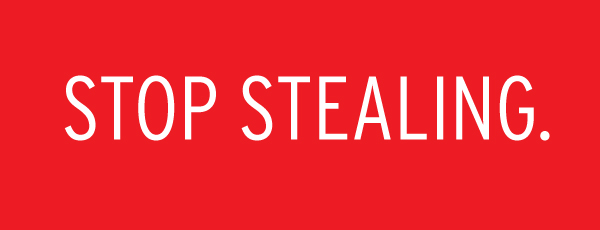Why is stealing images bad?
As of late we’ve been seeing a trend, both with photographers and with people, “Digitally Borrowing” other people’s photos. This is nothing new to the world, but do you know what really happens when a photo or image is stolen and used inappropriately? We’re going to talk about exactly that in our blog and our podcast (which you can listen to here).
Since the age of the internet, people have been “digitally borrowing” (let’s use this term vs. stealing) photos, from gifs, to jpegs, and now video, but do we really know what is the true negative impact of doing it? Most of us have no malicious intent in doing so and don’t think they’ll be any consequences… but little do we know it can be the same as stealing something right from a store’s shelf. With the average of over 1 trillion – yes, 1 trillion pictures taken as a whole collective in the world (each year? Last year?) – somehow, somewhere, a photo is going to be “digitally borrowed”. So that being said, let’s look at what happens to the photo from the time it gets online to its being “ripped” to reused, almost always without permission from the original owner.
 When anyone posts a picture, video or any type of media online, people can view it. From Facebook, Twitter, Instagram, Snapchat or any other forms of social media out there, it’s there for the public to see. Most times it is a harmless picture like a selfie, family, food, or even a travel pic, but when someone hits that right click button and then save as, you do not know what is going on after that….
When anyone posts a picture, video or any type of media online, people can view it. From Facebook, Twitter, Instagram, Snapchat or any other forms of social media out there, it’s there for the public to see. Most times it is a harmless picture like a selfie, family, food, or even a travel pic, but when someone hits that right click button and then save as, you do not know what is going on after that….
Most just save it and share the media socially, posting their own comment, though there are some that do more to the picture. They will alter it to their hearts’ desire, then repost it online. Others will take it and make it a part of a larger picture, and there are some that just post it online on other sites to advertise a service or product (trust me, it is not a good shopping site that you are thinking). Now think about this – what if you took that great shot of a sunset, or that food dish, or a nice macro shot of a rose up close? How would you feel knowing that someone “digitally borrowed” the photo, altered it, printed it and took credit for your work? Or what if they altered it to make it look like you’re doing something that you are not, or place a quote on there to misrepresent you somehow? What can you do to protect yourself and images that you post?
The first thing to remember is that if you post online, depending on where you are posting, that you are under the guidelines and TOS (Terms of Service) or EULA (End User License Agreement) of that social media platform. Know how they can use your images. Also understand that anything that you post online can be viewed, ripped and shared, even if you decided to use a “non-right-click option” on the site. If someone wants that image, sound, video of you or what you post, they will find a way to get it. To be honest, if you don’t want that photo, video, audio or any type of media to be “digitally borrowed” then it’s best to just not share it online. But because of the nature of social media, we are creatures of habit sharing our daily lives and what we are doing at any moment. Here are some steps on what to do with your media to keep it as protected as possible.
- We cannot say this enough; if you are afraid that someone will take your idea, then watermark your media. Most times this will deter someone from taking the media.
- Make sure that your settings are locked down on social media to people that you trust. Does this work all the time? Maybe not, but it will at least restrict the content to only people who you want to see it.
- If you are not sure whether to post something or not, better not to. You can always post it later if you change your mind. In this day and age, anything that is posted online can be used against you or worse – open a can of worms with people who, for no reason, love to start online drama.
 If you are in the profession of having your images online and you make a monetary gain from it as a form of marketing, that’s another can of worms. If you have a professional, blog, podcast, pictures, video, or other forms of media, be sure to copyright it, watermark it and make sure to track it online to make sure that it is only posted where you authorize it to be. There are some services out there that can help you track your work and make sure that it is only going where you want it to; Digimarc is one great service that we use to track our photography, and to us and our clients, it’s worth every penny.
If you are in the profession of having your images online and you make a monetary gain from it as a form of marketing, that’s another can of worms. If you have a professional, blog, podcast, pictures, video, or other forms of media, be sure to copyright it, watermark it and make sure to track it online to make sure that it is only posted where you authorize it to be. There are some services out there that can help you track your work and make sure that it is only going where you want it to; Digimarc is one great service that we use to track our photography, and to us and our clients, it’s worth every penny.
Again, there is no way to prevent “digitally borrowing” content online, but for those that think that it is not harmful to the original artist, think of what happens to their work when it is taken and altered:
- The artist loses any sales from that content because it was stolen.
- The content can be altered to make the original artist look bad because of bad editing, which in turn makes the artist look like they do not know what they are doing.
- The hard work, financial investment that the artist put into making that content will not be reimbursed via sales of that content, therefore the artist would be losing income on that content. It’s no different than stealing a paycheck – or several – from the artist.
- The artist’s work can be taken by someone else who takes credit, therefore getting awards, compensation and other gains that the original artist should be getting and is not.
- With the original artist’s content stolen, it causes the artist to not trust posting their work online, and in turn shrinks their market for their new content to be sold.
Artists put in time and effort to make these masterpieces, from photography, audio, video or even digital content just like any other profession. Taking the content without permission is stealing, and since artists often spend a long time on one piece, it’s stealing a lot. Most people that do this are aware of it and do not care, but again, how would you feel if you put your life and soul into a piece only to see it stolen and redistributed to others as the thief is making a profit from it? So before you think that taking a harmless photo of a nice landscape to print out for your office is ok, think about how you’d feel if the artist walked into your office and took your paycheck.

